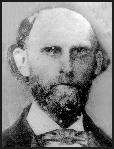Robert V. Richardson
Robert Vinkler Richardson (November 4, 1820 – January 6, 1870) was a brigadier general in the Confederate States Army during the American Civil War.
Robert V. Richardson | |
|---|---|
 | |
| Born | November 4, 1820 Granville County, North Carolina |
| Died | January 6, 1870 (aged 49) Clarkton, Missouri |
| Place of burial | |
| Allegiance | |
| Service/ | |
| Years of service | 1861 – 1865 (CSA) |
| Rank | Brigadier General |
| Battles/wars | American Civil War |
| Other work | civil engineer |
Early life
Richardson was born in Granville County, North Carolina, on November 4, 1820. His family moved to Hardeman County, Tennessee, when Richardson was a child. Richardson was admitted to the bar and moved to Memphis, Tennessee, in 1847 to practice there. He made business connections with Nathan Bedford Forrest and Gideon J. Pillow.[1]
Civil War
During the early part of the War, Richardson served under Pillow and recruited the 12th Tennessee Cavalry (also known as the 1st Tennessee Partisan Rangers) and was elected that unit's colonel.[2][3] Richardson engaged in the Battle of Shiloh and the Siege of Corinth. He was attached to Forrest's command in the fall of 1863. On December 3, he was appointed brigadier general; however, after being confirmed his nomination was returned by the Confederate Senate at the request of President Jefferson Davis on February 9, 1864. From then to the remainder of the War, his regiment was attached to James R. Chalmers' command.[4]
A communication from Richardson dated October 28, 1863 at Water Valley, MS indicated the difficult living conditions experienced during the War: "For God and the country's sake, make your fair promising but never complying Quartermaster send me skillets, ovens, pots, or anything else that will bake bread or fry meat. I want clothing, shoes and blankets for my naked and freezing men. . . . I cannot fight any more until I get something to cook in."[5]
Post-War and murder
After the War, Richardson travelled abroad and lived overseas. He returned to Memphis and worked in levee and railroad construction with Forrest. After stopping at a tavern in Clarkton, Missouri, on January 5, 1870, he was shot by an unknown assailant who fired a shotgun at him from behind a wagon in the tavern yard.[6] He died the next day and is buried in Elmwood Cemetery in Memphis.[7]
See also
- List of American Civil War generals (Confederate)
- List of unsolved murders
Notes
- Warner, Ezra J. Generals in Gray: Lives of the Confederate Commanders. Baton Rouge: Louisiana State University Press, 1959. ISBN 978-0-8071-0823-9. p. 256.
- Loving, Waldon. 2002. Coming Like Hell: The Story of the 12th Tennessee Cavalry, Richardson’s Brigade, Forrest’s Cavalry Corps, Confederate States of America, 1862-1865. NY: Writer's Club Press. 232 pages.
- Tennesseans in the Civil War, Confederate Cavalry Units: 12th (Richardson’s-Green’s) Tennessee Cavalry Regiment
- Warner, p. 256
- Civil War Centennial Commission of Tennessee. Tennesseans in the Civil War: A Military History of Confederate and Union Units with Available Rosters of Personnel. In Two Parts. Part 1. Nashville: Civil War Centennial Commission, 1964, 1965. Reprinted Knoxville: University of Tennessee Press, 1981, 1984. ISBN 978-0-87402-017-5. Page 81.
- Memphis Public Ledger January 11, 1870. p.3
- Warner, p. 256-57.
References
- Civil War Centennial Commission of Tennessee. Tennesseans in the Civil War: A Military History of Confederate and Union Units with Available Rosters of Personnel. In Two Parts. Part 1. Nashville: Civil War Centennial Commission, 1964, 1965. Reprinted Knoxville: University of Tennessee Press, 1981, 1984. ISBN 978-0-87402-017-5.
- Eicher, John H., and David J. Eicher, Civil War High Commands. Stanford: Stanford University Press, 2001. ISBN 978-0-8047-3641-1.
- Memphis Public Ledger January 11, 1870. p.3
- Loving, Waldon. 2002. Coming Like Hell: The Story of the 12th Tennessee Cavalry, Richardson’s Brigade, Forrest’s Cavalry Corps, Confederate States of America, 1862-1865. NY: Writer's Club Press.
- Sifakis, Stewart. Who Was Who in the Civil War. New York: Facts On File, 1988. ISBN 978-0-8160-1055-4.
- Tennesseans in the Civil War, Confederate Cavalry Units: 12th (Richardson’s-Green’s) Tennessee Cavalry Regiment Tennessee Gen Web.
- Warner, Ezra J. Generals in Gray: Lives of the Confederate Commanders. Baton Rouge: Louisiana State University Press, 1959. ISBN 978-0-8071-0823-9.